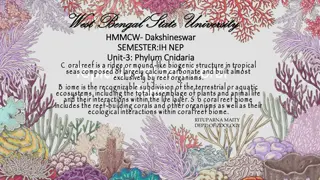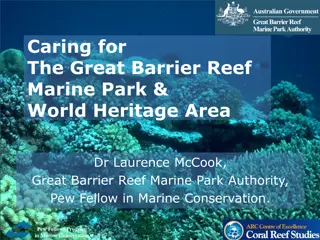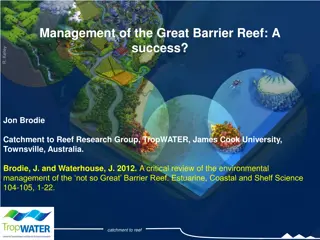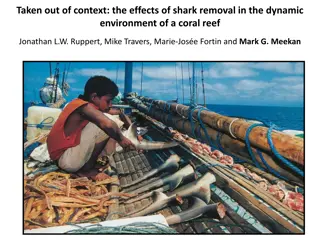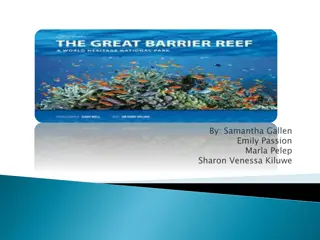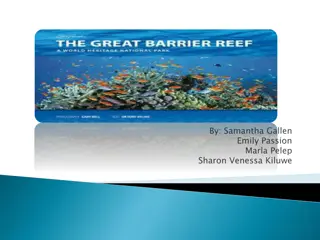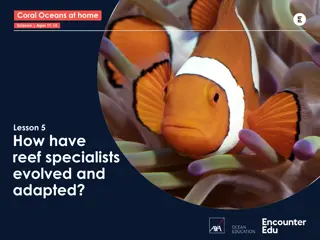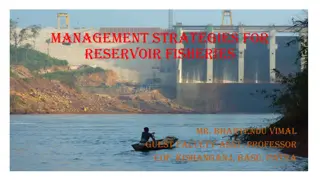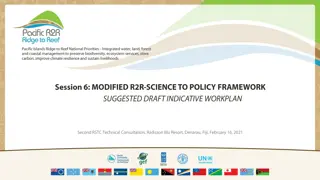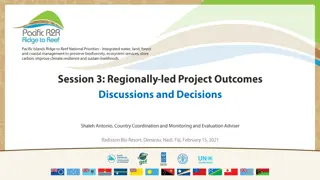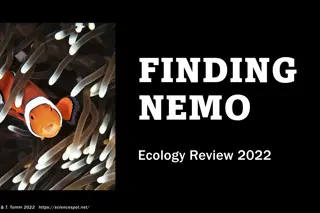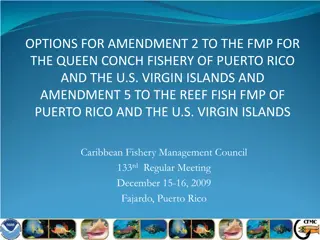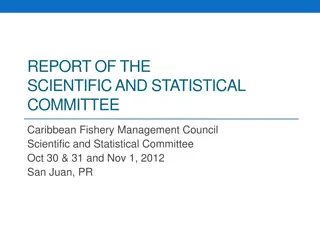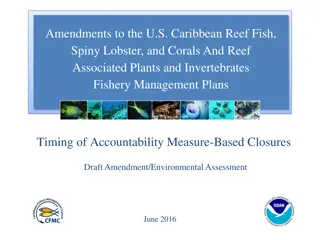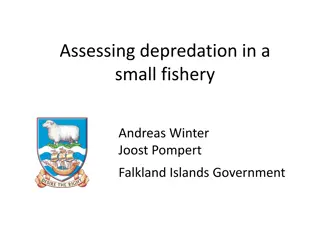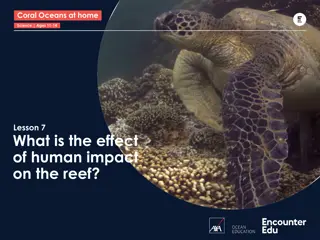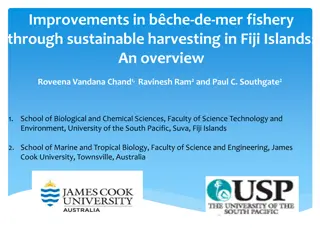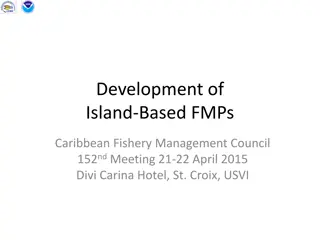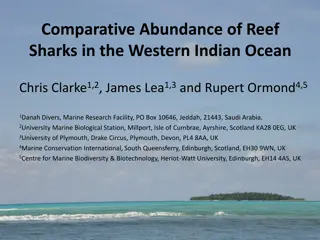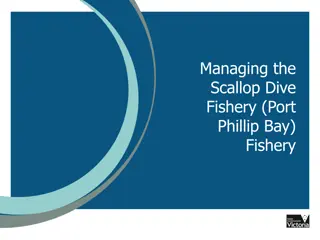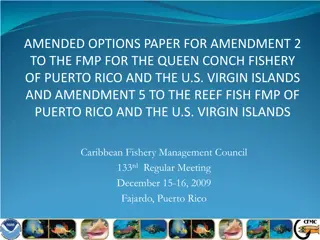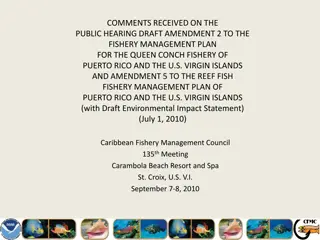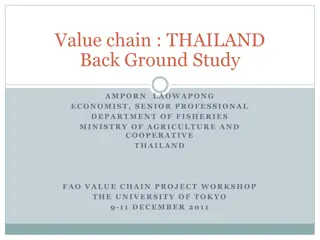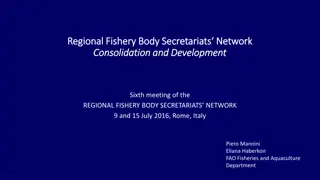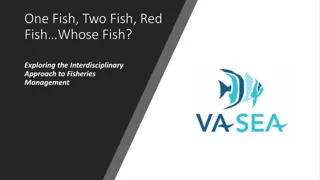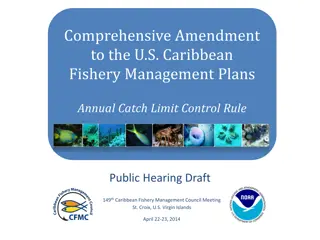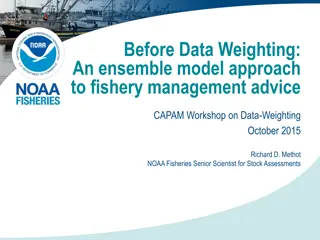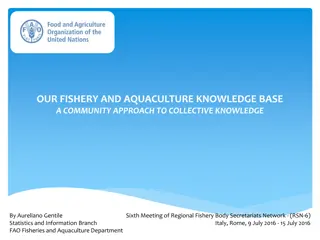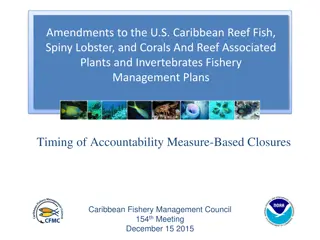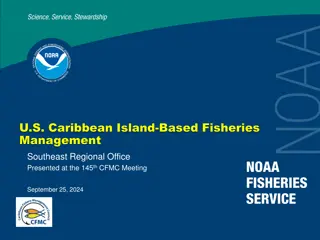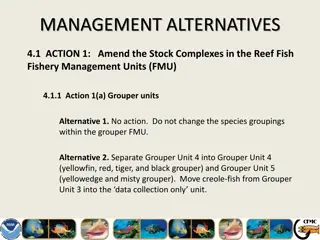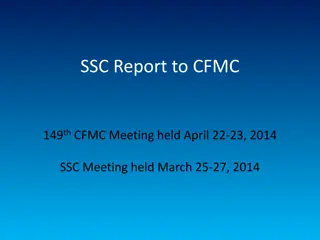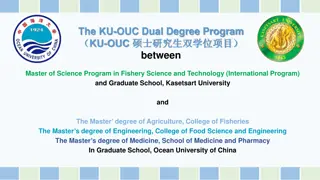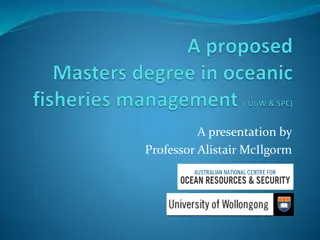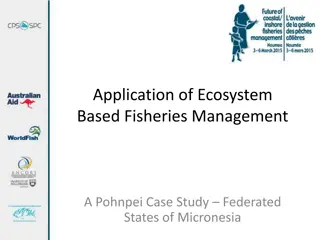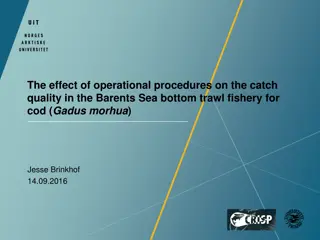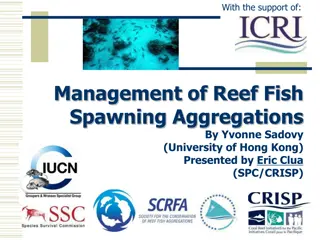Sustainable Fisheries Management Project in CARICOM
Establishment of framework for local fisherfolks, authorities, and organizations to manage fishery resources around coral reefs. Project phases include baseline survey, pilot activities, and wrap-up. Key concepts focus on sustainable development, community involvement, and resource enhancement. Proj
0 views • 7 slides
Serco Business Illahee Tire Reef Cleanup Phase 2 Project Overview
Serco Business, in collaboration with Port of Illahee, is undertaking a tire reef cleanup project as mandated by regulatory requirements. The project involves removing clumps of tires near Illahee pier, evaluating water quality impacts, and establishing best practices for removal. The methodology in
0 views • 12 slides
The Fascinating World of Coral Reefs and Their Biodiversity
Coral reefs are vital biogenic structures formed by reef-building corals and various marine organisms. These ecosystems, found in diverse regions like the Caribbean, Indo-Pacific, Fiji, and Bermuda, host a rich array of flora and fauna, including corals, fish, turtles, and sea snakes. The intricate
5 views • 14 slides
Conservation Efforts and Management Strategies for the Great Barrier Reef
Dr. Laurence McCook, an authority on the Great Barrier Reef Marine Park, discusses the environmental, social, and economic importance of the reef. The key management tool of zoning, part of an integrated strategy, regulates activities in different zones to ensure conservation. Through adaptive manag
0 views • 15 slides
Environmental Challenges Facing the Great Barrier Reef
The management of the Great Barrier Reef has faced significant challenges leading to a decline in coral cover, dugong populations, seagrass health, and shark populations. Issues such as fishing practices, terrestrial pollutant runoff, and climate change have contributed to the deterioration of the r
0 views • 16 slides
Impacts of Shark Removal on Coral Reef Dynamics
This study delves into the repercussions of shark removal on the intricate ecosystem of coral reefs. It explores the correlation between shark abundance, reef fish community structure, benthic disturbances like cyclones and bleaching, and the synergistic effects of top-down and bottom-up processes.
1 views • 18 slides
Discovering the Wonders of the Great Barrier Reef
The Great Barrier Reef, located off the coast of Queensland, Australia, is the world's largest coral reef system, spanning over 2,900 individual reefs and 900 islands. Protected by the Great Reef Marine Park, it is a vital part of Aboriginal Australian and Torres Strait Islander cultures. The reef s
0 views • 8 slides
Discover the Splendor of the Great Barrier Reef
The Great Barrier Reef, located off the coast of Queensland, Australia, is the world's largest coral reef system, comprising over 2,900 individual reefs and 900 islands. This natural wonder supports a diverse ecosystem and is a popular destination for tourists seeking unique marine experiences. Howe
0 views • 8 slides
Exploring Adaptations of Reef Specialists
Delve into the evolution and adaptation of reef specialists in Lesson 5 of Coral Oceans at Home Science for ages 11-14. Discover specific adaptations used by coral reef species, the necessity of adaptation for survival, diverse adaptation strategies on the reefs, and create the ultimate coral animal
0 views • 20 slides
Enhancing Fishery Management Strategies in Indian Reservoir Fisheries
The demand for fish in India is increasing rapidly, but natural fish production from reservoirs is limited. The average fish productivity in Indian reservoirs needs to be improved to meet population demands. Strategies for fishery enhancement focus on optimizing ecosystem utilization, modifying habi
0 views • 16 slides
GEF Ridge to Reef Programme for Sustainable Development in Pacific Islands
The GEF Ridge to Reef Programme, a collaborative effort by UNDP, FAO, and UNEP, aims to support the strategic investment for sustainable development in Pacific Islands through integrated environmental and natural resource management. Challenges such as the COVID-19 outbreak and limited local experti
0 views • 6 slides
Mainstreaming Ridge to Reef Consultancy: Preliminary Results and Lessons
This paper presentation focuses on the capacity needs assessment, lessons learned, and gender equity and social inclusion work in Ridge to Reef projects. The discussions revolve around assessing the methods used by Consultants, the contribution of preliminary findings to improving understanding and
0 views • 4 slides
Exploring the Ecology of Finding Nemo and the Great Barrier Reef
Delve into the fascinating world of "Finding Nemo" as it intertwines with the rich ecosystem of the Great Barrier Reef. Discover the challenges faced by marine life, from clownfish hiding in anemones to symbiotic relationships among different species. Learn about conservation issues like pollution,
0 views • 5 slides
Proposed Amendments for Queen Conch and Reef Fish Fisheries in Puerto Rico and US Virgin Islands
The Caribbean Fishery Management Council discussed amendments to the Fishery Management Plans for Queen Conch and Reef Fish in Puerto Rico and the US Virgin Islands during their 133rd Regular Meeting in December 2009. The amendments focus on setting annual catch limits for commercial harvest of quee
0 views • 48 slides
Caribbean Fishery Management Council Scientific and Statistical Committee Report 2012
The Scientific and Statistical Committee (SSC) of the Caribbean Fishery Management Council reviewed species units with Annual Catch Limits (ACL) overages and discussed research priorities. When ACLs are exceeded, accountability measures are triggered, leading to a reduction in the fishing season. Th
1 views • 26 slides
U.S. Caribbean Reef Fishery Management Plans Amendment Summary
Amendments were proposed in June 2016 to the U.S. Caribbean Reef Fish, Spiny Lobster, and Corals And Reef Associated Plants and Invertebrates Fishery Management Plans. The focus was on the timing of Accountability Measure (AM)-Based Closures, with two key actions: modifying the implementation timing
0 views • 12 slides
Studying Depredation in Small Fishery Operations
The assessment of depredation in a small fishery, particularly in the Falkland Islands, is explored through various studies and monitoring efforts. The research includes evaluating the impact on fish populations, interactions with whales, and the existence of invisible depredation. Observers were em
0 views • 40 slides
Addressing Whale Depredation in Longline Fisheries: A Global Perspective
Whale depredation on longline fisheries is a pervasive issue affecting various types of fishing practices like pelagic and demersal longline fisheries. Different approaches to mitigate depredation include research on whale populations, fishing practice adjustments, and technological solutions. Colla
0 views • 16 slides
Impact of Human Activities on the Great Barrier Reef
The Great Barrier Reef, a natural wonder, has significantly suffered from human impact since 1987. The reef has lost half of its coral cover due to factors like bleaching, crown of thorns starfish outbreaks, and storm damage. Despite these challenges, 47% of the coral cover remains healthy, emphasiz
0 views • 11 slides
Sustainable Harvesting for Improved Bche-de-mer Fishery in Fiji Islands
Sea cucumbers have been a vital income source in Fiji, but outdated processing methods and management practices have hindered progress. Research aims to enhance the bche-de-mer fishery through sustainable harvesting and proper management for economic and ecological benefits.
0 views • 20 slides
Development of Island-Based Fishery Management Plans by Caribbean Fishery Management Council
Island-based Fishery Management Plans (FMPs) are being developed by the Caribbean Fishery Management Council to tailor fisheries management to the specific needs of each island based on species targeted, gears used, available markets, economies, fisheries, and social and cultural nuances. The discus
0 views • 20 slides
Comparative Abundance of Reef Sharks in the Western Indian Ocean
Global concern over the decline in shark populations in the Western Indian Ocean is highlighted in this study. The research aims to assess the current abundance of sharks in various locations and investigate the ecosystem-level effects of predator loss. Methods include surveys using Baited Remote Un
0 views • 15 slides
Sustainable Management of Port Phillip Bay Scallop Fishery
Management strategies of the Port Phillip Bay Dive Scallop Fishery include objectives for long-term sustainability, equitable resource access, and cost-effective management. Conservative measures such as setting Total Allowable Commercial Catch (TACC) based on annual abundance surveys and implementi
0 views • 8 slides
Proposed Stock Complex Amendments for Caribbean Reef Fishery Management Units
Amendments proposed for the reef fishery management units in Puerto Rico and the U.S. Virgin Islands include changes to stock complexes for parrotfish, grouper, and snapper units. The proposal suggests separating parrotfish units, modifying grouper units, and adjusting snapper units. Additionally, t
4 views • 72 slides
Public Hearing Draft Amendments to Fishery Management Plans in Puerto Rico and U.S. Virgin Islands
Review the received comments on the draft amendments to the fishery management plans for the Queen Conch fishery and Reef Fish fishery in Puerto Rico and the U.S. Virgin Islands. The amendments include proposed changes to stock complexes, species groupings, and management units for grouper and snapp
0 views • 39 slides
Analysis of Fishery Industry in Thailand
The analysis focuses on the supply, utilization, and demand aspects of the fishery industry in Thailand, highlighting key production figures, species involved, and their impact on small-scale fishermen. It covers production, import, utilization, domestic consumption, export, and processing aspects,
0 views • 20 slides
Enhancing Regional Fishery Body Secretariats Network Development
The Regional Fishery Body Secretariats Network focuses on enhancing cooperation among member organizations to strengthen regional fisheries governance and aquaculture development. Through promoting information sharing and collaboration, the network aims to support the role played by Regional Fishery
0 views • 7 slides
Exploring Interdisciplinary Approaches to Fisheries Management
Delve into the world of fisheries management through an interdisciplinary lens, focusing on topics such as sustainability, stakeholder perspectives, and the impact of regulations on various fishing communities. Join Shelby White, a PhD student at VIMS, as she researches changes in coastal commercial
0 views • 6 slides
Revised U.S. Caribbean Fishery Management Plans
Amendment proposed at the 149th Caribbean Fishery Management Council Meeting aims to establish a control rule adjusting catch limits based on overfishing status changes. The amendment seeks to ensure sustainable fisheries by providing flexibility to adapt to FMU status changes. Buffer reductions app
0 views • 27 slides
Ensemble Modeling in Fishery Management: Insights from CAPAM Workshop
Structural uncertainty dominates fishery management decisions as discussed in the CAPAM workshop on data-weighting. The workshop highlighted the importance of ensemble modeling, protocols for ensemble membership, and communication of ensemble distributions for effective decision-making. Various case
0 views • 17 slides
Enhancing Fisheries and Aquaculture Knowledge for Sustainable Development
The Fishery and Aquaculture Knowledge Base, presented at the Sixth Meeting of Regional Fishery Body Secretariats Network, focuses on collective knowledge exchange in the fisheries and aquaculture sector. This knowledge hub offers a wealth of information on various aspects, supporting Sustainable Dev
0 views • 13 slides
Amendments to U.S. Caribbean Fisheries Management Plans - December 2015
Amendments were proposed for the U.S. Caribbean Reef Fish, Spiny Lobster, and Corals and Reef Associated Plants and Invertebrates Fishery Management Plans in December 2015. The amendments focused on modifying the timing of accountability measure-based closures and specifying the frequency of reviewi
0 views • 14 slides
Island-Based Fisheries Management in the U.S. Caribbean Region
The management of fisheries in the U.S. Caribbean region is undergoing a shift towards island-based management rather than species-based. This transition involves steps such as developing environmental assessments, initiating NEPA processes, and drafting new island-based Fishery Management Plans (FM
0 views • 7 slides
Reef Fish Fishery Management Alternatives Overview
Amend the stock complexes in the reef fish fishery management units by considering different actions for the grouper and snapper units. The proposed alternatives aim to redefine management reference points for various species groups within the snapper, grouper, and parrotfish complexes. These adjust
0 views • 38 slides
Criteria for Species Inclusion in Fishery Management Plans
The report outlines criteria for species inclusion in island-based fishery management plans, covering national standards, stock management, and minimizing costs. It discusses key factors such as target stocks, ecosystem components, and economic importance. The suggested draft criteria include biolog
0 views • 17 slides
Dual Degree Program: Master of Science in Fishery Science and Technology
The KU-OUC Dual Degree Program offers a unique opportunity for students to earn dual degrees from Kasetsart University and Ocean University of China. This program combines expertise from various fields such as agriculture, engineering, and medicine, providing a comprehensive and diverse educational
0 views • 14 slides
Ocean Fishery Management Development Program Overview
The presentation by Professor Alistair McIlgorm discusses the background and annual activities of the SPC regarding stock assessment workshops in Noumea, New Caledonia. It highlights the proposed program for multi-disciplinary research and education on oceans governance and maritime security. Additi
0 views • 14 slides
Ecosystem-Based Fisheries Management in Pohnpei: A Case Study
The application of ecosystem-based fisheries management in Pohnpei, Federated States of Micronesia, involves a top-down regulatory history followed by a bottom-up approach focusing on the establishment of marine protected areas. The characteristics of Pohnpei's coral reef fisheries show declines in
0 views • 18 slides
Enhancing Catch Quality in Barents Sea Bottom Trawl Fishery
This study aims to investigate the impact of operational procedures on catch quality in the Barents Sea bottom trawl fishery for cod. It includes assessing the effects of prolonged buffer towing, excessive fish exclusion devices, and utilizing a new codend design with an inverse hydrostatic release
0 views • 5 slides
Importance of Managing Reef Fish Spawning Aggregations
Reef fisheries play a significant role in global fishery landings, supporting millions of people. However, the exploitation of valuable species that aggregate to spawn can lead to overfishing due to inadequate management, conservation, and monitoring. The decline of aggregating fishes in regions lik
0 views • 32 slides


